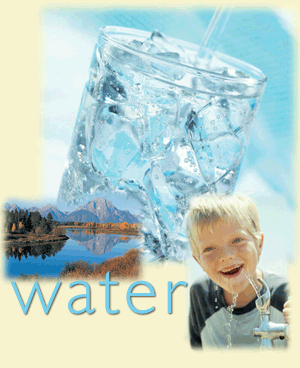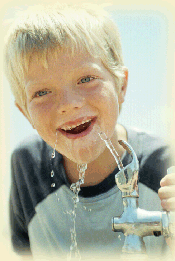Water
by Cameron Woodworth
This article was originally published in August 2003

“For many of us, water simply flows from a faucet, and we think little about it beyond this point of contact.”
— Sandra Postel, author
(August 2003) — During this dry month of August, the Sound Consumer examines the state of our water — without which we’d have no agriculture, no food, no life.
Water, as important as it is for our food and the planet’s well being, is one of those things we often take for granted. But it’s becoming increasingly clear that water needs our attention. What follows is a quick primer on three of the biggest water challenges facing us: the quality and cleanliness of our water, threats to the amount of fresh water available, and the growing trend toward corporate privatization of and monopoly over water supplies around the world.
Water purity
Drink a glass of tap water in some communities around the United States and you’re likely to get more than just water. In a study last year, the United States Geological Survey (USGS) sampled 139 rivers and streams and found that low concentrations of birth control pills, estrogen replacement drugs, ibuprofen, bug spray, sunscreen and antibacterial soap are among the products that may make it into that glass of water. These ordinary household items often survive wastewater treatment and make it back into the nation’s bodies of water.
“This study raised a bunch of red flags,” Dana Kolpin, lead author of the USGS study, told E Magazine. “At these low concentrations, I think there are going to be long-term effects that may take several generations to show up.”
Theo Colburn, senior scientist at the World Wildlife Fund (WWF) and author of “Our Stolen Future,” worries about pharmaceutical estrogens mixing with chemicals such as dioxin and PCBs that are present in streams. “All of these compounds are going into a chemical soup,” she says. “You can liken it to side effects you get with a prescription drug — you don’t know how it’s going to interact with the over-the-counter drugs you’re taking. It’s the unexpected, interactive effects we never predicted that are a real concern.”
The USGS had previously found 23 different pesticides in Seattle watersheds. Diazinon, an insecticide often used to kill crane flies, was found in all streams tested at levels well above safety standards.
These issues caught the eye of Seattle City Councilwoman Margaret Pageler, chair of the Seattle City Council’s Water and Health Committee. She says that while most Puget Sound metropolitan residents are fortunate to get our drinking water from uncontaminated deep aquifers or protected mountain reservoirs, fish may be another story. Infinitesimal amounts of wastewater contaminants such as birth control pills are causing sex reversal in fish in the Northwest’s waterways.
Seattle’s drinking water sources may be OK, but the Natural Resources Defense Council, a national nonprofit environmental group, said last month that our water often picks up high levels of lead on its way to the tap. As part of a study of the nation’s water supply, the NRDC found that 14 percent of water samples tested here had lead levels of more than 15 parts per billion — the highest levels in the country among large municipal supplies. Levels of cryptosporidium, a water-borne parasite, also are detected at levels of concern in Seattle’s water.
Dr. Tim Takaro, a University of Washington professor of medicine and environmental health, and member of Washington Physicians for Social Responsibility, told the Sound Consumer that pregnant women, children or people with compromised immune systems should avoid Seattle tap water or treat it before cooking or drinking.
Seattle Public Utilities is working on making its water supply less corrosive to prevent lead from being so easily leached from older pipes. Measures also are being taken to reduce the levels of cryptosporidium.
Another concern among consumer advocates is the Bush administration’s attempts to gut the Clean Water Act, which has protected the nation’s inland and ocean waters from pollution for 30 years. In January, the Bush administration said it would consider removing as much as one-fifth of the nation’s water bodies and wetlands from Clean Water Act protection. Here in Washington, the policy might remove protection for mudflats that scientists say are critical to the health of Puget Sound.
Global warming threatens supply
Global water consumption is doubling every 20 years — more than twice the rate of human population growth. People worldwide increasingly can’t get clean drinking water. According to the Canadian Broadcasting Corporation, 1.1 billion people lack access to clean drinking water. In India, some pay a shocking 25 percent of their income on water. Around the world, governments have turned to building increasing numbers of environmentally destructive dams to capture water. The number of large dams around the world has increased from 5,000 in 1950 to 38,000 today.
Much of the problem is a direct result of overpopulation. Global warming is affecting water supply around the world. Here in the Pacific Northwest, the springtime snowpack is steadily declining, according to Philip Mote, a research scientist with the University of Washington Pacific Northwest Climate Impacts Group. Mote found that the amount of water contained in the regional snowpack has declined as much as 60 percent in some places from 1950 through 1992.
Last year, two dozen scientists from the UW, the USGS and other institutions released a study showing that global warming will have a devastating effect on the availability of water in the western United States, even under the most optimistic scenarios. For example, there will be enough water in the Columbia River system during the summer and fall to generate electricity, or during the spring and summer for salmon runs, but not both. Reservoir levels along the Colorado River are expected to drop by more than a third, causing hydropower generation to be cut by as much as 40 percent.

Privatization: The oil of the 21st century
While water may be one of the necessities of human life, it is also, according to Fortune magazine, “one of the world’s great business opportunities. It promises to be to the 21st century what oil was to the 20th.” Increasingly, multinational corporations are pressuring governments to turn over the functions of public water utilities to the private sector.
Earlier this year, the International Consortium of Investigative Journalists (ICIJ) launched a one-year project in North America, Latin America, Europe and Asia to examine the impact of privatization of the world’s water supplies. According to the ICIJ, three private water utility companies — Vivendi and Suez, both of France, and Thames, based in England but owned by German conglomerate RWE — have grown explosively in the past decade, quietly assuming control over the water supplied to nearly 300 million people in all of the world’s continents.
Analysts expect these companies will control 65 to 75 percent of what are now public waterworks in Europe and North America in the next 15 years. The private global water market is worth $500 billion a year, and the ICIJ says it could grow to $3 trillion in the next few years.
Bob Carty, a reporter with the Canadian Broadcasting Corporation, was part of the ICIJ study. He told listeners that what privatization means “is that in places like Africa, Asia and Latin America, you were formerly paying your water bill to a public utility that was controlled by elected politicians. When it goes private, you’re paying it to a private company. There’s less transparency, less accountability, and part of the profits each time you flush the toilet or open the tap are going off to places, most likely Britain and France.”
The World Bank, according to Carty, has been a key proponent of the push to privatization, going so far as to tie loans to the condition that governments must privatize part of the water utilities, or in some cases another publicly held asset. “”The World Bank justifies this by saying it’s just trying to get water to poor people. Critics call it a strong-arm tactic that’s designed to pry open markets for business.” Analysts are worried that water privatization will lead to higher rates and interruption of service for the poorest customers.
What you can do
Water purity
- Tap water suppliers must provide annual water quality reports to their customers. Get a copy by calling your water provider.
- Consider using a water filtration system to purify your water — one more sophisticated than those attaching to faucets. Many PCC shoppers bring in one-, two-and-a-half-, or even five-gallon jugs to fill with Custom Pure self-serve filtered water at 45 cents per gallon. Custom Pure uses a multi-stage water treatment system in the store. It employs carbon absorption, demineralization by ion exchange, and ozone injection. Ozone is capable of killing bacteria 1,000 times faster than chlorine, without producing nasty byproducts associated with chlorination. The treatment system significantly reduces contaminants such as chlorine, lead, asbestos, fluoride, arsenic, nitrates, cryptosporidium and more.
Health guru Andrew Weil, M.D., recommends steam distillation or carbon filtration systems (see www.drweil.com).
The Washington Toxics Coalition, based in Seattle, also offers filter recommendations and extensive information for protecting water quality at www.watoxics.org.
Shower filters, too, are available from Custom Pure (available at PCC) or from www.gaiam.com. - Use less of everything, especially the amount of drugs and waste products you add to the water supply.
The World Wildlife Fund’s Colburn recommends returning old prescriptions to the pharmacy rather than flushing them down the toilet; avoiding the unnecessary use of antibiotics; choosing natural menopause remedies instead of prescription hormone replacement therapy drugs and switching to antibiotic-free meat or a plant-based diet. - When washing dishes or clothes, use the least amount of detergent that does the job. Some experimentation will be required, but the minimum amount that works will be substantially less than what the cups hold. Excessive soap isn’t necessary and can wear on machine parts. Use a detergent that avoids chlorine bleach, phosphates and alkylphenol ethoxylates (APEs) such as Country Save, Ecover or Seventh Generation.
- Take your car to a commercial carwash where the runoff goes into the sewage treatment system. Don’t wash your car on pavements where runoff goes into storm drains and local creeks and streams.
- Educate yourself about the Bush administration’s attack on the Clean Water Act at www.earthjustice.org/action. Send emails to your senators and representative.
- Convince your city council or school district to adopt a pesticide reduction policy. The Washington Toxics Coalition can help you every step of the way. Contact Angela at 206-632-1545 or at
astorey@watoxics.org - Urge the Washington Department of Transportation to stop spraying roadsides with pesticides, especially in Snohomish, Island, Jefferson, Thurston and Clallam counties, which have approved no-spray policies. The WDOT ignores these policies. Write to Doug MacDonald, Secretary of Transportation, PO Box 47316, Olympia, WA 98504-7316.
Water supply
- Use less water. Several utilities, including Seattle’s, have put together the Saving Water Partnership and offer extensive tips for water conservation (www.savingwater.org).
-
Learn more about global warming at the following Web sites:
- Sierra Club, www.sierraclub.org/globalwarming
- Natural Resources Defense Council, www.nrdc.org/globalwarming
- Environmental Defense, www.environmentaldefense.org
Water privatization
- Read the International Consortium of Investigative Journalists’ report on water privatization at www.icij.org/water.
- The Canadian Broadcasting Corporation, in conjunction with the ICIJ, ran a week-long series of reports on “Water for profit: How multinationals are taking control of a public resource.” Excellent audio and written reports are available at www.cbc.ca/news/features/water/index.html.
- Public Citizen has an activists’ guide to water privatization at www.citizen.org/cmep/Water/activist.
